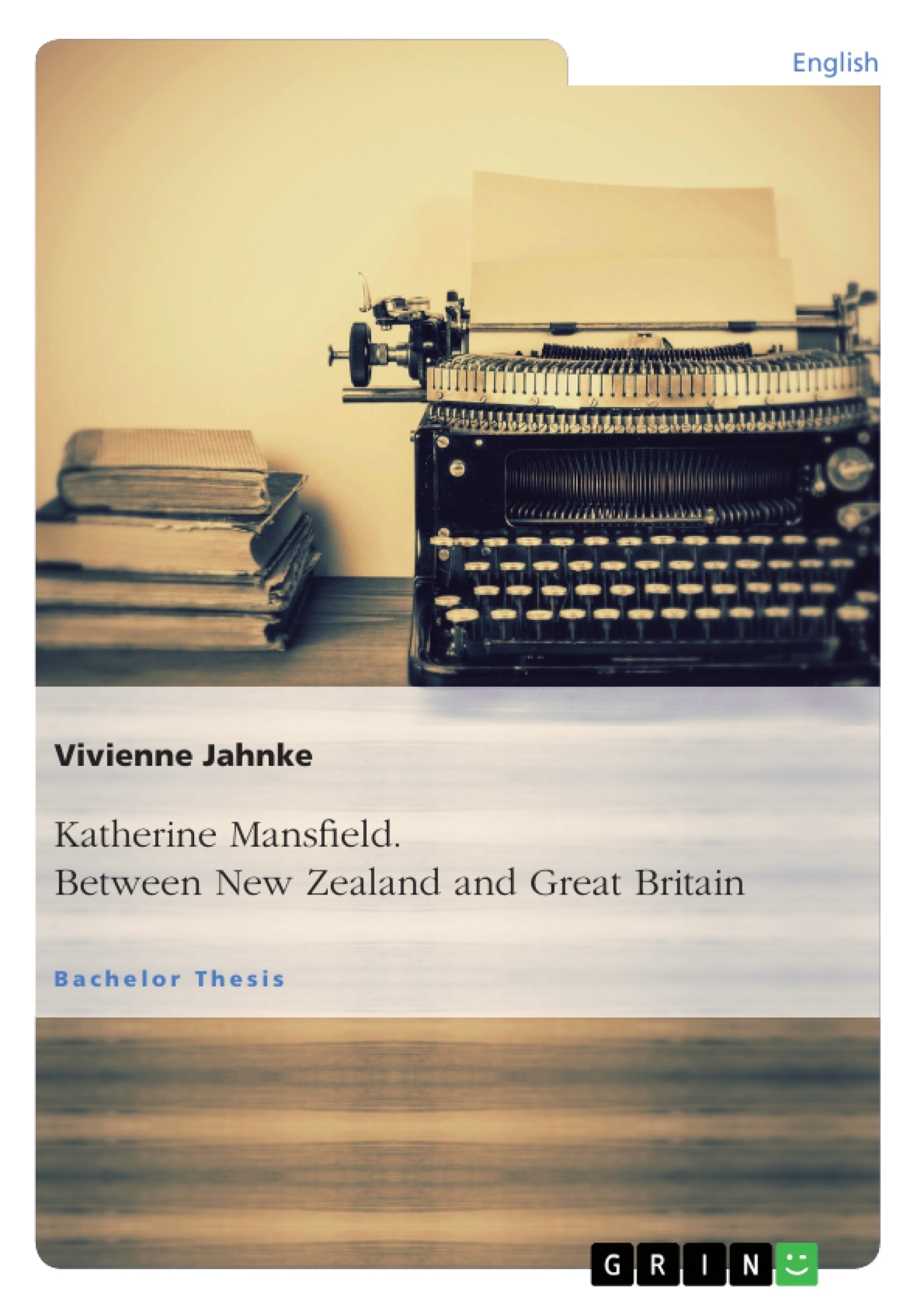This thesis focuses on presenting reasons for either including or excluding Katherine Mansfield in the New Zealand canon of literature and argues her affiliation to the country.
Situating Mansfield within either the British or the New Zealand canon of literature is difficult; several attempts have been made over the past decades. Often, the work on the subject has been inconclusive, Mansfield’s writing was found to show attributes which would make it possible to include her with both the New Zealand and the European or British tradition of writing. Other times the evidence let to different evaluations, clearly situating her in the British canon only. These pages shall give an explanation for this ambiguity.
Inhaltsverzeichnis (Table of Contents)
- I. Introduction - Discussing Katherine Mansfield
- II. "The Little Colonial" - Colonialism and the Empire Problem
- a. "Something Essentially New Zealand about Miss Mansfield?" - Mansfield and New Zealand
- b. "A Divided Self" - Colonialism and Home
- III. New Zealand or British Canon of Literature
- a. The New Zealand Stories - An Analysis
- b. Dear Miss Mansfield - Postcolonial Re-workings
- IV. Conclusion
- V. Works Cited
Zielsetzung und Themenschwerpunkte (Objectives and Key Themes)
This thesis aims to investigate the complex and ambiguous position of Katherine Mansfield within the literary canons of both New Zealand and Great Britain. It explores the influence of her colonial upbringing on her writing and examines the extent to which her stories resonate with both New Zealand and British literary traditions.
- The impact of colonialism on Mansfield's identity and writing
- The analysis of Mansfield's New Zealand stories and their connection to the New Zealand canon
- The exploration of Mansfield's place within the British modernist movement
- The examination of postcolonial reinterpretations of Mansfield's work
- The challenges of categorizing Mansfield within a specific national literary tradition
Zusammenfassung der Kapitel (Chapter Summaries)
The introduction provides biographical context for Katherine Mansfield's life and work, highlighting her unique position as a writer who straddled both New Zealand and British literary traditions. It also introduces the central question of the thesis: whether Mansfield should be considered a New Zealand or British author.
Chapter II explores the influence of colonialism on Mansfield's identity and writing. It examines the challenges of categorizing her work within either the New Zealand or British canon and argues that her colonial background is essential to understanding her writing.
Chapter III focuses on an analysis of Mansfield's New Zealand stories. It delves into the linguistic, thematic, and stylistic elements that connect her work to the New Zealand literary tradition. This chapter also examines the reception of Mansfield's work within New Zealand and the postcolonial re-workings of her stories.
Schlüsselwörter (Keywords)
This thesis explores the key themes of colonialism, identity, literary canon, New Zealand literature, British literature, Modernism, postcolonialism, and short story writing. It examines Katherine Mansfield's work through these lenses, offering insights into her ambiguous position within national literary traditions.
Frequently Asked Questions
Is Katherine Mansfield considered a New Zealand or British author?
Situating Mansfield is complex; she is often included in both canons. Her writing shows attributes of the European Modernist tradition but remains deeply rooted in her New Zealand colonial upbringing.
How did colonialism influence Mansfield's identity?
Mansfield often felt like a "divided self." Her colonial background provided a unique perspective that allowed her to critique the Empire while still feeling a connection to "home" in both countries.
What are the key themes in Mansfield's New Zealand stories?
Her New Zealand stories often explore childhood, family dynamics, social class, and the specific landscape and linguistic nuances of her homeland.
What is Mansfield's role in the British Modernist movement?
Mansfield was a pioneer of the short story form, using stream of consciousness and focus on interiority, which placed her at the heart of the Modernist movement alongside writers like Virginia Woolf.
How do postcolonial re-workings view her work?
Modern postcolonial interpretations analyze her work through the lens of power dynamics and identity, re-evaluating her place in the New Zealand literary tradition as a voice of the colonial experience.
- Quote paper
- Vivienne Jahnke (Author), 2013, Katherine Mansfield. Between New Zealand and Great Britain, Munich, GRIN Verlag, https://www.grin.com/document/317244



